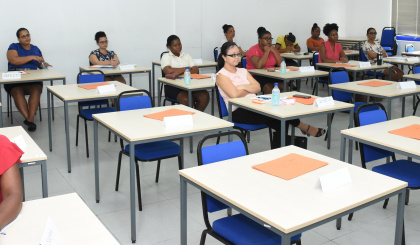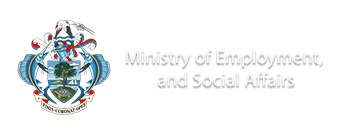Workshop discusses workplace flexibility management
Thirty-two participants from government departments, parastatals and the private sector are participating in a three-day workshop at The Guy Morel Institute (TGMI) on performance management for workplace flexibility.
The three-day workshop for chief executives, human resource persons, middle management and supervisors is being organised by the productivity unit in the Ministry of Employment, Immigration and Civil Status (MEICS) in collaboration with TGMI.
Implementing workplace flexibility requires a shift in the way managers perceive their employees. It provides an opportunity to align personal goals with organisational goals with the focus on results. It will enable participants to acquire relevant competences in performance management as a tool to support labour productivity.
Performance management requires understanding of what is to be achieved, managing and developing the organisation in a way which sustains output of desired results. This will include determining goals, objectives, key result areas, tasks to be carried out, their performance indicators, monitoring reporting, and finally how the staff will be appraised in the new environment where workplace flexibility is being implemented.
So the objectives of the interactive three-day workshop co-facilitated by TGMI executive director Shella Mohideen and TGMI lecturer Nella Belmont, is for the participants to (1) understand and apply motivational theories to the workplace, and have a good understanding of a range of techniques to motivate, (2) understand the concept of working from home and flexible working hours,(3) discuss the rational of introducing performance management in support of working from home and flexible hours, (4) apply skills to design and implement an effective and workable performance management system suitable to their specific organisation, (5) design and apply the appropriate tools used in performance management including the performance agreement and (6) to develop a framework for performance measurement.
Maryvonne Francis, responsible for MEICS productivity unit, said that Covid-19 has brought along situations where employers should start to re-think on how to gain maximum productivity out of some of their employees through set targets and deadline, in adopting the workplace flexibility system.
She said that during the lockdown, only workers from essential services came down to work while those from non-essential services worked from home, thus proving that flexible work arrangement is feasible and it will be a win win for both the employers and the employees.
She claimed that the Central Bank of Seychelles, the Seychelles Pension Fund, the National Institute of Science and Technology among some others are implementing flexible working hours which is working well for them in terms of productivity.
Mrs Francis said that government is working on a draft proposal for flexible working hours to be put before cabinet while the productivity unit works to educate and sensitise people on flexible working hours and its benefits.
According to Mrs Mohideen, we, in Seychelles, think that for somebody to be productive at work, he or she must be physically present at the place of work. She noted that certain people should be allowed to work flexible hours, including working from home through monitoring and set targets.
She said that the country should change the mindset that the only way to be productive is to be physically present at the workplace.
Mrs Mohideen claimed that many workers in Seychelles need not be working physically in an office but rather at home and that would spare the employers working space and rent fees which could be used as incentive for the workers, while the roads will be spared from traffic jam during peak hours.
She further claimed that many people in offices need only their laptop, mobile phone and data to work and so they can do whatever work that needs to be dome at home.
She said that there are tools nowadays to monitor workers who are assigned to work from home while the cost of the data can be discussed between the employer and the employee.
The workshop continues today and will end on Friday September 25, 2020.

Participants during the session yesterday (Photo: Anel Robert)
Patrick Joubert



